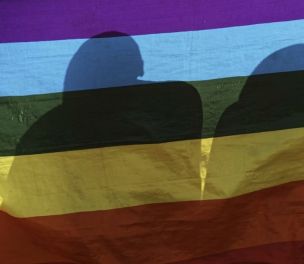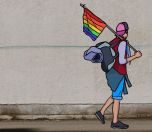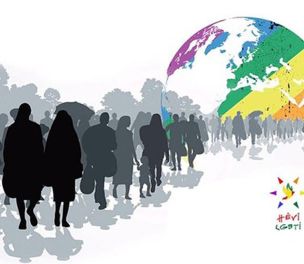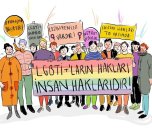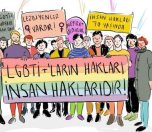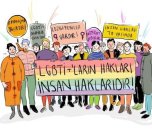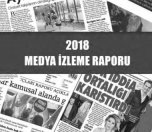Click to read the article in Turkish
Ankara-based Kaos GL LGBTI Association has published its report "Turkey's Challenge with LGBTI Refugees" in Turkish and English.
Published with the support of United Nations High Commissioner for Refugees (UNHCR) as part of "Advancing Human Rights of Lesbian, Gay, Bisexual, Transgender, Intersex (LGBTI) Refugees in Turkey Project" conducted in 2017, the report is dedicated to the memory of Muhammad Wisam Sankari, a Syrian gay refugee killed in İstanbul in 2016.
CLICK - Read the full report in English
The report aims to document the obstacles faced by LGBTI refugees in Turkey in enjoying and accessing the fundamental rights and services in various areas and in social life as well as the discrimination and violence they encounter. Accordingly, LGBTI refugees whose housing rights were violated in Turkey shared their experiences with Kaos GL:
'They don't want to see two men standing side by side'
8 percent of LGBTI refugees participating in the research stated that they were asked questions about "whether being married and with family" in renting a house. A gay refugee recounted his experience as follows:
"Real estate agents are asking 'Are you married? Why are you alone? Where is your family?' I did not think Turkey is such a place. 'Why did not you get married until now? Are you Sunni? Or are you Shia?' they asked. Neighbors around again ask, 'Why did not you get married? What were you doing in Iran? Where will you go?' I feel here that they do not want two men standing side by side. Even when they say hello, they think twice. Actually, it's not clear that we're gay. A neighbor came and asked, 'Do you have a guest?' For that reason, we are not comfortable at home; we think they want to learn something from us. We do not even open the curtains, we do not want them to see two men in the house."
The report also shows that the attitude of house owners towards refugees takes a xenophobic tone. A gay refugee expressed it in following words:
"Maybe we could not have had these problems if this city was a little bigger. Because now all the real estate agents say that 'You either are a fag or infidel' when I told them that I am Iranian."
Another gay refugee said:
"After renting the house, the neighbors disturbed me a lot. They created problem why my house owner gave the house to me, as a single and a foreigner person. A friend of mine was forced to evacuate the house because of neighbors even though there was no problem with the house owner."
34 percent faced fraud while renting a house
During the interviews conducted with LGBTI refugees by Kaos GL, 38 people stated that they had problems in renting a house.
While 34 percent of them stated that they were refused for being a foreigner while renting a house, 25 percent of them stated that they faced fraud by house owner/real estate agent.
Those who managed to rent a house indicated that people intervened in their private lives. A lesbian refugee shared the following experience:
"I am currently staying with my partner. So far, we did not face a problem with the house owner and neighbors. Because we always conceal ourselves. Only just my partner looks a bit physically different, sometimes my partner faces leering by them."
'Turkey As LGBTI Refugees' Way Station' report online
Published by Kaos GL within the scope of Monitoring Human Rights of LGBTIs Project, "Waiting To Be 'Safe And Sound': Turkey As LGBTI Refugees' Way Station" report can also be reached online.
Report aims to document discrimination and violenceThe report aims to document the obstacles faced by LGBTI Refugees in Turkey in enjoying and accessing the fundamental rights and services in various areas and in social life as well as the discrimination and violence they encountered on account of their sexual orientation, gender identity and intersex conditions (SOGIIC). It has shown that LGBTI refugees, who fled their countries due to the discrimination and persecution they were exposed to on account of SOGIIC, are experiencing the same exposure in Turkey on account of their sexual orientation, gender identity, intersex conditions and/or gender expression in addition to the xenophobia against refugees. |
(EMK/SD)





